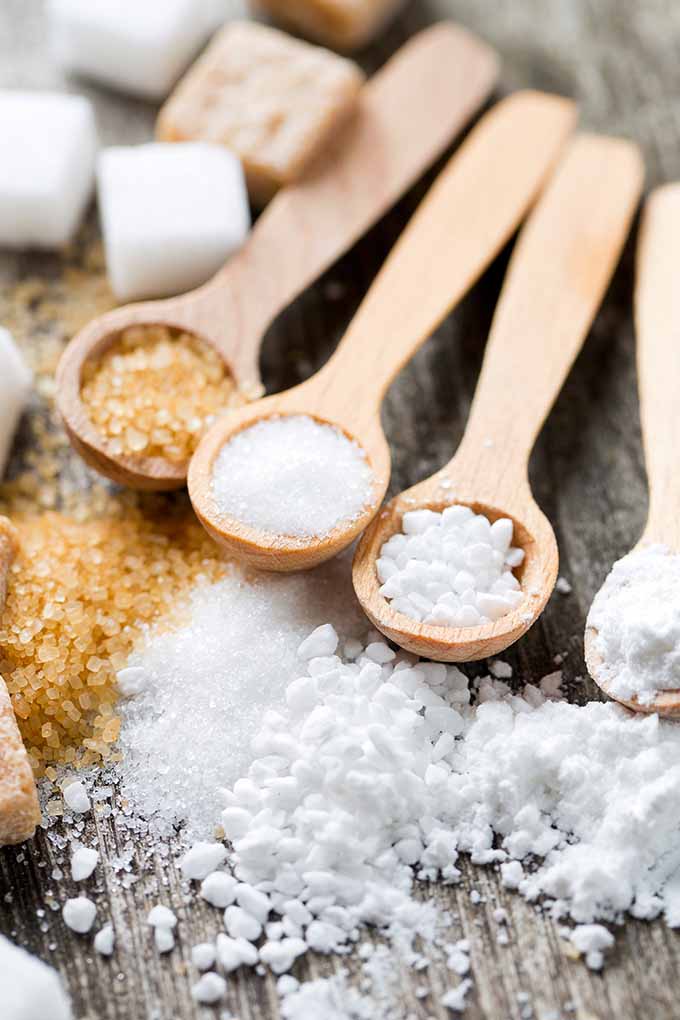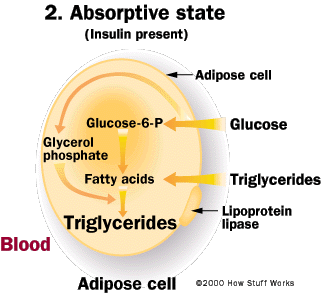https://files.peakd.com/file/peakd-hive/zydane/Wwba7tff-Many-Types-of-Sugar.jpg
We often hear the word sugar just thrown around. Usually its something like "avoid too much sugar" which is actually a pretty good guideline for most people to follow. But, did you know there are many different types of sugars, some of which can be beneficial and some which are terrible...and even some that our body can't digest?

## Mono-sacchardies, di-saccharides and more The most common sugars that most people are aware of are **glucose** and **fructose**. Glucose being a mono-saccharide means that it is the simplest form of sugar; it is the most easily absorbed through the digestive tract. It is used for fuel in different cells and even is stored in muscle cells for fast acting fuel! Our brain also uses glucose as a source of energy. Fructose is another monosaccharide, yet it is not absorbed as quickly in the body. For this reason, it is actually quite useful for people with glucose metabolism problems such as diabetics. This is main sugar found in natural fruits and vegetables. It has uses in sports drinks as well, since it is mixed with glucose, the athlete will get some quick energy (glucose) and some more sustained energy (fructose). Then there is **sucrose** which is also common table sugar. It is a disaccharide meaning it is composed of two monosaccharides: glucose and fructose linked together. Despite common belief it is also found in many foods...but is well known to be in processed products. Add on top of that we have **lactose** (milk sugar) and even the lesser known **galactose** which is combined with glucose to create lactose. It is important from a health perspective to know the basics of these different sugars because they can be used strategically for sports performance. For instance, obviously if you are sitting around watching t.v. then you do not need lots of "quick" energy like simple sugars. Your body won't need them and will store them through triglycerides as fat cells.

*image courtesty of Howstuffworks.com* ## The fake stuff Here's where it gets interesting. I think most people have heard of artificial sweeters such as **sucralose** or **saccharin**. These became very popular back in the day when medical frauds such as Ancel Keys demonized fat and the "low fat diet" paradigm came into being, to our collective chagrin as it is a horrible idea. But I digress. Artificial sweeteners, while they carry "zero calories" are actually still sugars...our body just lacks the digestive enzymes to break them down. So the theory was that since we couldn't absorb them, they wouldn't add to calorie load and would serve as a good substitute to real sugars. Nothing could be further from the truth. The thing is, they trick the body hormonally. Here's how it works, very simply: When you consume a sugar, any sugar, or an artificial sweetener, the enzymes in the mouth and the taste buds send signals that tell your body to dump blood sugar. This is a normal response to avoid **hyperglycemia** which is too much sugar in the blood. The body dumps the blood sugar, or should I say stores in as fat, in anticipation of the new inflow of sugars. This works ok for natural sugars like fructose, lactose and glucose. They are fairly quickly absorbed so the blood sugar returns to normal. The thing about artificial sugars is that the body does the same thing, only it can't digest these sweeteners. But the insulin response, which tells your body to store sugar and is the major cause of diabetes by creating insulin resistance in cells, is still present. So, you can still become insulin resistant with artificial sweeteners, and on top of that you *can't use them for fuel*. So you get the negative effect on the blood, but no fuel source. Lots of people fell for the hype of things like "diet coke" or "coke zero" and thought that since there are no "calories" so to speak that they could just drink them with impunity. But the bad effects of all that sugar are still there. They've been implicated in many diseases...the same [diseases that are caused by too much real sugar](https://www.sciencedaily.com/releases/2017/07/170717091043.htm#:~:text=Artificial%20sweeteners%20may%20be%20associated,according%20to%20a%20new%20study.&text=Consumption%20of%20artificial%20sweeteners%2C%20such,sucralose%2C%20is%20widespread%20and%20increasing.) Frankly, people have been tricked and many people consume far too many artificial sweeteners. On top of that, things that cannot be absorbed tend to have consequences [in the gut](https://www.cnbc.com/2018/10/03/artificial-sweeteners-are-toxic-to-digestive-gut-bacteria-study.html#:~:text=According%20to%20a%20study%20published,digestive%20gut%20microbes%20of%20mice.). ## What does processing do to sugars? There are many tribes that have been known to [chew on raw sugarcane for energy](https://www.ncbi.nlm.nih.gov/pmc/articles/PMC4441162/). Yet they may not show any sort of the health problems of the obese Western culture. Why? Its important first to understand that the word "processing" in terms of food merely means changing its environment. Many things can sap nutrients from natural sugar containing foods like fruit, vegetables and especially sugarcane...a major source of common sugars. If you freeze food, you process it. If you heat it, you process it. If you break an egg into a pan...you are processing it. If you blend food, you are processing it. If you take food out of the fridge and let it thaw, you are processing it. If you beat food to a pulp, you are processing it! The common forms of "processing" that we refer to are the industrial type and this is where the demon-form of sugar, **high fructose corn syrup** comes in! When high fructose corn syrup is created, which creates an unnatural conglomerate of approximately 55% fructose and 45% glucose, there is heavy processing using high pressure, heat, and even bleaching agents. These natural sugars, which are also bound to natural forms of antioxidants, vitamins and minerals, are pummeled into submission and this intense processing removes or destroys all of the health benefits of natural sugars. This is why eating a fruit is far healthier than consuming a soda. On paper, the soda is just glucose and fructose...both of which are found naturally in foods. So what gives? Industrial processing strips all nutrition and leaves the final product a nutrient devoid mutant that is simply pure sugar with zero health benefits. Our body's don't like that...and since it is so prevalent and created to satisfy taste, it causes all sorts of problems like obesity, heart disease, elevated tryglicerides, brain problems...and even **glycation** which is when sugars bind abnormally to random cells in the body, causing oxidative damage and created more mutant proteins and cells. That's why high fructose corn syrup is so deadly. It brings all the detriments of too much sugar, without any of the natural health benefits. Its literally an empty calorie poison that should be avoided at all cost. Its important to note in terms of processing that even TCM, or Traditional Chinese Medicine, involving grinding herbs, roots and other nutrients into a bowl...is still processing! ## So which do I need? Like talked about at the beginning of this article, different times and energy needs require different sugars. To be honest, things like keto, with very low sugar, are effective...but not exactly practical in the West...especially with athletes. Simple sugars such as galactose, fructose and glucose should be consumed around times of physical exertion...whether its working out, hiking, or even doing some gardening. These activities will ensure that not only is the quick energy being used like its supposed to, but the work itself, especially weight bearing activity, will tend to reverse the insulin resistance by consuming sugars. However, there is never a time where a soda, which can have up to 72 grams of HFCS is useful. Not only are you not getting the natural health benefits but you simply never need that much sugar. But sports drinks...high quality sports drinks that is, not glorified sodas such as Gatorade (which started out great until Coca Cola bought it and hijacked it) are useful for providing quick fuel. After all, fat is a great fuel but it is not exactly a fast acting fuel. There is a time for sugar. Fructose is useful for low intensity exercise, where the slower-absorbing properties of this sugar will come in handy. For very high intensity exercise like extreme hiking or sprinting or sports, some glucose will not hurt! ## Conclusion All sugars are not created equal. They have different properties and depending on the source different nutrient profiles. Pure sugarcane is vastly different than high fructose corn syrup. Fructose in lower doses is not the same as a crappy product with 30 grams of fructose. This is all advertising and consumer creating drivel. The more sugar is packed into something the sweeter it tastes and the more humans will like it, period! This has caused quite the schism in health where few people know how much of what they actually need. Ten grams of fructose won't hurt...but fifty grams is far too much! For more of these nutrition tips follow my account, I'm here to educate people about how to use food and supplementation for maximum efficency. Namastay Healthy!

Originally posted here: https://hive.blog/hive-120078/@zydane/what-s-the-difference-between-different-sugars-which-are-good-and-which-are-bad


No comments:
Post a Comment